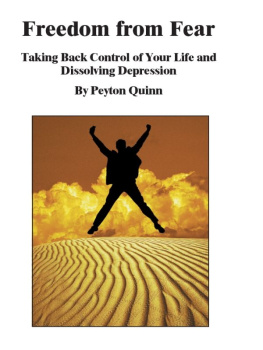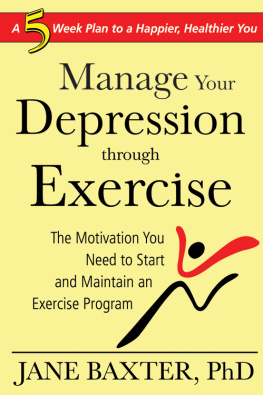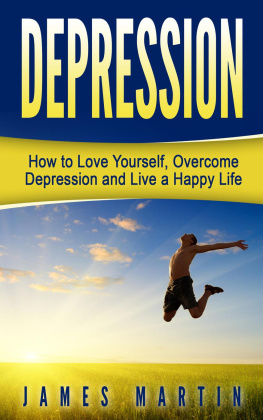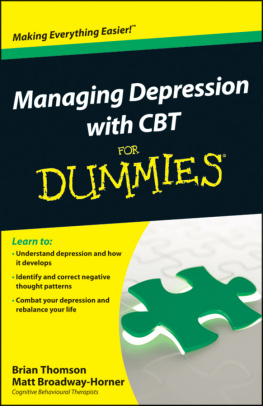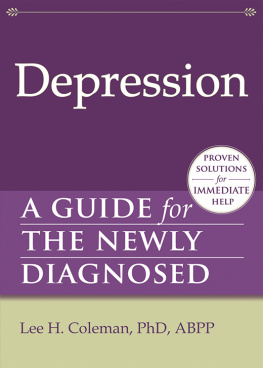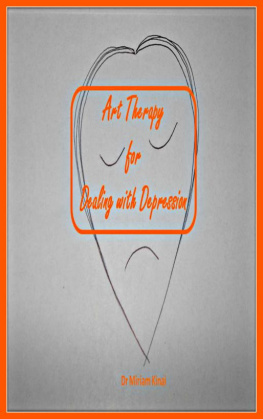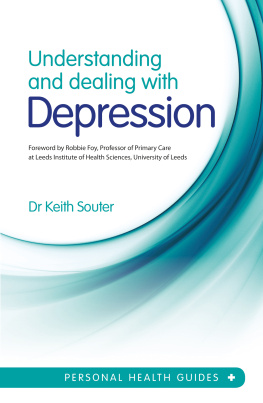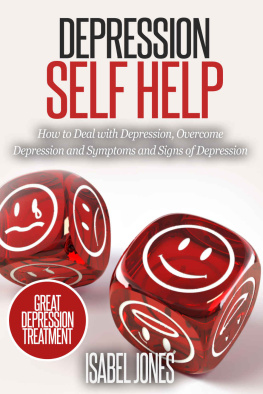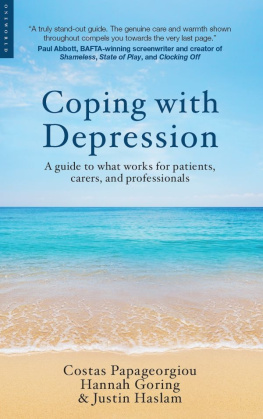

Dedicated to Melissa,
My wife of nearly 30 years

Freedom from Fear:
Taking Back Control of Your Life and Dissolving Depression
By Peyton Quinn
Box 535 Lake George, Colorado 80827
719-748-8555
Second Printing: September, 2004
All rights reserved. No part of this book may be reproduced without written permission from the publisher, except for reviewers and scholars, who may quote excerpts for newspapers, magazines, books, and electronic publication. No part of this book may be reproduced, stored in a retrieval system, or transmitted in any form or by any means electronic, mechanical, photocopying, recording, or other, without written permission from the publisher.
www.rmcat.com
2004 Peyton H. Quinn
Printed in the United States of America
ISBN 09759996-0-5
E-Book ISBN: 978-1-61789-573-9
Table of Contents
Depression can descend into a persons life at any time and for many different reasons. It often follows a loss, severe disappointment, or serious life set back. Death, divorce, trauma, illness, and job loss are all implicated in the onset of depression. Almost all human beings will experience some or all the symptoms of depression at some point in their lives.
If the depression is of brief duration or the symptoms are not severe, the individual will likely recover with no treatment at all, just as most of us recover from a cold, the flu, and many minor infections without medical care. For a significant number of people, however, the symptoms of depression will last long enough or be severe enough that care will be required. Good psychiatric care can make the difference between suffering from a mild depression and a severe depression, or suffering from a severe depression and suffering from a debilitating, life-threatening depression. Antidepressant medication, talk therapy, and life style changes can all play a major role in alleviating depressive symptoms, returning a person to a state of well being, and protecting against the recurrence of depression.
One of the most pernicious problems with depression is that the disease and its attendants (lack of confidence, difficulty getting started, a sense of failure, generalized pessimism, feeling inadequate, a sense of being overwhelmed, a sense of lacking control) can insinuate itself into our very identity or sense of self. Past accomplishments no longer supply us with a sense of confidence. Diplomas, awards, and years of service or hard work become pale and insubstantial. Relationships that were once nourishing and vital become burdensome, or we fake our way through our interactions and workunable to live up to our past selves, unable to locate the confidence and ease we once had in our relations and conversations. Activities that we once anticipated with enthusiasm and that we participated in with pleasure lose their allure and become just one more burden in a long string of burdens that ends only with the end of our lives.
If that is all that life isjust a string of moments bereft of meaning, passion, or enjoyment, moments that we must endure or fake our way throughthen what is the point? Why not end it now? This, for better or worse, is the thinking (often unspoken and sometimes un-thought) underlying depression.
Because depression corrodes our self-confidence, our ability to enjoy relationships, our pleasures in living, and even the very meaning of our lives, the depressed person will often not seek help. What is the point, after all? Depression can also feel more like reality than normal reality does. A depressed reality can feel more real than anything else. At last we know the truth, the depressed person thinks: There is no point to life, it is all meaningless. All that passed before was just an illusion; all our accomplishments were not real, just exercises in vanity and ultimately without meaning. If depression affects the way we think and feel in this manner, it is entirely logical that the individual would not make an effort to seek help. What would be the point when everything is pointless?
Another reason that depressed people do not seek help is to avoid appearing weak. Our society respects self-sufficiency and independence. No one wants to need anyone elses help. Being in need is seen as a kind of failure. So depressed people try to tough it out, try to pull them selves out of it. But this is to underestimate the nature of the enemy. Depression robs us of our strength, motivation. Even our physical energy level drops. Our hope is corroded, our sources of nourishment are stolen, and we are left without resources we need to fight the enemy.
And this is why it is not simply a matter of strength or pulling yourself up by your bootstraps. There is no strength to be had; there are no bootstraps to pull oneself up by.
Unfortunately this is always why the depressed person will often not seek help: out of a desire to avoid appearing weak, or as a manifestation of their loss of hope. That it feels like reality is the nasty aspect of depression. In fact, it can seem even more real than the way life normally seems. At last I know reality, life is pointless. And, according to some psychologists and philosophers, this realization contains a kernel of truth, that is, that human beings invest life with meaning through love, belief, faith, relationships, creativity, a sense of dutywhatever combination of virtues that allow us to carry onsometimes joyfully, some times sadly, most times somewhere in-between the two with our life of toil, pain, pleasure, and boredom.
So, how do we turn this ship around, steer it away from the rocky shoals of depression, pointlessness, meaninglessness and toward hope, toward love, toward possibility? Well, if at all possible, the person in the grip of a depression should certainly spend time with a mental health professional to assess the severity and duration of their depressive state and to rule out other possible causes for the symptoms (organic illness, substance abuse, etc.). Once this is addressed, a combination of medication and talk therapy is the recommended treatment for depression.
But what if depression has infiltrated the persons sense of self and chronically impairs their ability to assert themselves, to take on appropriate life and relationship challenges and risks? This is where real life experiences can play a very helpful role. If the person can tackle appropriate life riskslooking for and taking a new job or starting a new business, looking for, beginning, and sustaining relationships, or whatever action would be meaningful and provide the experience of success (however small)then the path away from failure, lack of confidence, withdrawal has begun.
But what if life in all its randomness and unfairness deals us a set back at this important moment? We all hope that life will be fair and that it will eventually reward our reasonable (and sometimes unreasonable) risks and projects. And those of us who are not depressed recognize this fact, and although we might be disappointed or even partially crushed we are not undone. It is the price one pays for ambition. But for the depressed person, or one not entirely recovered, a set back can be devastating.
Many therapists, myself included, have wished and even tried to provide an opportunity for a person to try out new behaviors to take on safe challenges. If only there was a laboratory for patients where they could challenge themselves to be more assertive, to think more positively, to tackle a situation with confidence with the knowledge that they had nothing to lose. But the dilemma is that if there is nothing to lose, how can it translate into confidence?
Next page
